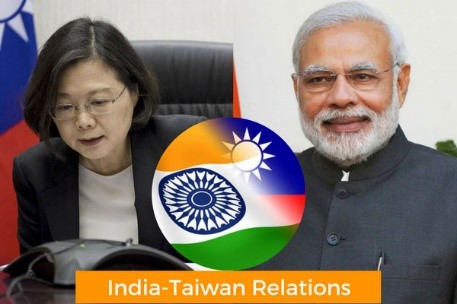





Disclaimer: Copyright infringement not intended.
Context
READ ALL ABOUT INDIA TAIWAN RELATIONS: https://www.iasgyan.in/daily-current-affairs/india-taiwan-relations
India Taiwan Relations
Economic Relations:
Trade Relations:
Investment:
People-to-People Ties:
Global Cooperation:
Challenges and Sensitivities:
Strategic Dimensions:
Potential for Future Collaboration:
Conclusion
READ ALL ABOUT INDIA TAIWAN RELATIONS: https://www.iasgyan.in/daily-current-affairs/india-taiwan-relations
|
PRACTICE QUESTION Question: Examine the historical trajectory and contemporary dimensions of India-Taiwan relations, considering economic, strategic, and geopolitical aspects. Analyze the factors influencing India's approach to Taiwan within the framework of the "One-China" policy, and assess the potential implications and challenges for India in maintaining a balance between economic interests and geopolitical considerations in the Indo-Pacific region. India-Taiwan relations have evolved over time, marked by a pragmatic approach balancing economic interests and geopolitical considerations. The historical trajectory and contemporary dimensions of this relationship provide insights into India's nuanced stance within the framework of the "One-China" policy. Historical Trajectory: Historically, India-Taiwan relations have been primarily economic and people-centric. Economic ties, especially in sectors like electronics and manufacturing, have grown substantially. Despite the absence of formal diplomatic ties, both nations maintain unofficial channels, such as the Taipei Economic and Cultural Center (TECC) in India, contributing to cultural and educational exchanges. Contemporary Dimensions:
Potential Implications and Challenges:
In conclusion, India-Taiwan relations reflect a delicate balance between economic interests and geopolitical considerations. India's historical and contemporary approach involves maximizing economic opportunities while adhering to diplomatic norms, thus contributing to regional stability and fostering a pragmatic and nuanced engagement. The evolving dynamics in the Indo-Pacific region will continue to shape India's strategy towards Taiwan. |




© 2026 iasgyan. All right reserved